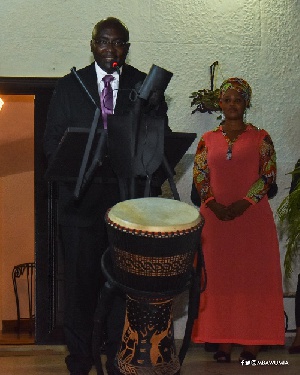Vice President Mahamudu Bawumia has urged the European Union (EU) and the European Business Organisation (EBO) to support Ghana with significant trade and investments towards creating a prosperous economy with decent jobs and dignified lives for its citizens.
He said the Government was in a hurry to transform Ghana’s fortunes; but it did not want to achieve this by resorting to aid and more borrowing, therefore, Europe should partner Ghana to succeed.
Vice President Bawumia, was addressing a reception jointly organised by the EU and the EBO - Ghana to mark the Second Anniversary of the latter.
He tasked the two sides to also partner Ghana to add value to its human resource talents to engage the world, and to its natural resources to export for premium value.
The EBO was established through the initiative of EU in Ghana and the National Chambers of Commerce of Germany, France, The Netherlands and Denmark to provide a lobbying and networking platform for European businesses worldwide.
Vice President Bawumia said from 2010 to 2016, Foreign Direct Investments from the EU to Ghana amounted to 2.7 billion dollars.
The EU’s exports to Ghana, he noted, had mainly been in the form of machinery and equipment, while Ghana’s exports to the EU market had mainly been in agricultural products.
“I note the increased share of oil imports from Ghana into the EU, which in 2014 constituted 40 per cent of all imports from Ghana,” he stated.

The Vice President urged the EU to increase the flow of machinery and equipment to drive Ghana’s production capacities.
On the nature of Ghana’s exports in the coming days, he stated: “With the coming into force of the Economic Partnership Agreement, Ghana expects to have access into EU markets with more diversified portfolio of products.
“We want to move from just agricultural products and oil. We want products from our non-traditional exports, light manufacturing industry, human talents outsources, products and services to the EU markets.”
He invited European investors to put money in the development of Ghana’s critical infrastructure, explaining that the Government wanted the private sector to primarily shoulder that responsibility as it also focused on the provision of stable and predictable macro-economic environment for businesses to thrive.
The tax cuts and reliefs in the 2017 Budget and other business friendly measures being implemented, the Vice President said, demonstrated Ghana’s commitment to cut the red tape and bureaucracy that often frustrated the flow and processes of business.

Mr William Hanna, the EU Ambassador to Ghana, welcomed the Government’s commitment to the agenda of macroeconomic stability, fiscal discipline, business reforms with dynamic export and investment promotion.
“We welcome the fact that your Government has placed the private sector at the heart of its development strategy,” he stated. “Today, we need a new partnership for business between the EU and Ghana- a new economic partnership.
“We now have the legal tools to do this, and we have the commitment on both sides. Now let’s work together to make it a success” he added.
Mr Hanna said the EU was interested in supporting ECOWAS both economically and politically, therefore, the recent visits of President Nana Addo Dankwa Akufo-Addo to the Sub-region to engage his counterparts to achieve a common prosperity was laudable.
The Chairman of the Board of EBO, Mr Olivier Vanparye, said his side would continually provide the knowledge and the links to European business entities to foster business growth, job creation and industralisation in Ghana and the Sub-region for mutual benefit.
“We are committed to maintain a positive approach on the different subjects, even the delicate ones such as local content,” Mr Vanparye said.
The reception afforded Ministers of State, Members of Parliament, captains of industries and businesses and representatives of business associations to dialogue and seek leads for partnerships.


Business News of Friday, 2 June 2017
Source: GNA

















